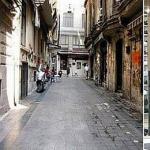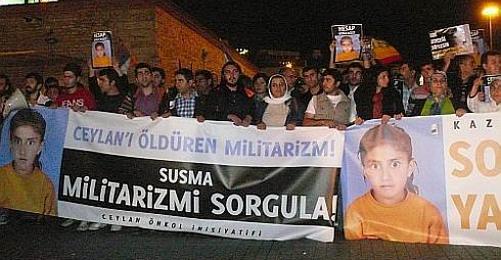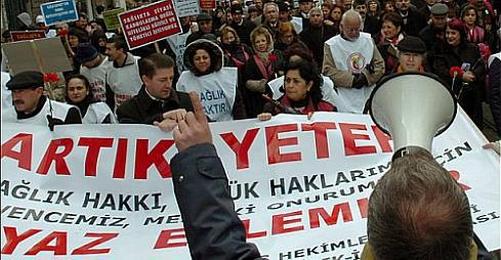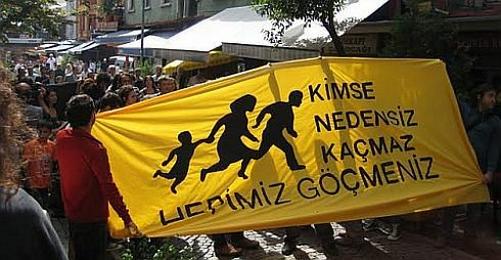The people living in the streets behind face the threat that they will lose their homes with the planned gentrification of the area. Kurds, Roma, refugees, and especially poor women, are mostly concerned with the daily struggle for survival.
They have little time to concern themselves with other facts: that Beyoğlu has a feminist mayoral candidate for next week’s local elections, that the pompous World Water Forum has been taking place in Istanbul, and that others are protesting against it because it aims to commercialise water, or that State Minister Mehmet Şimşek, responsible for the economy, has blamed the rise in unemployment on women seeking work.
bianet spoke to women on the weekly market.
Seven children and no work
H. Demir (30) has come to the market with two children, but there are five more at home. She speaks Kurdish, so her elder daughter translates for her:
“Four of the seven children are in school, the others are at home. My husband was a street seller, but now there is no work. We are desperate, trying to get by with whatever comes our way.”
“Will we be in the news? Don’t let my husband hear, he’ll kill me,” she then said. Because of her daughter next to her, I cannot ask, “Is the worry about getting by used as an excuse for violence in your home?” I know the answer anyway. Promising that I will change her name, I go on.
Minimum wage at upmarket shopping centre
Elif Saraban (19) is a sales person at the newly-built Cevahir shopping centre in upmarket Şişli. I meet her in front of the cosmetics stall on the market. She says, “Because of our work, we have to look good for our customers. I get the minimum wage. I help with the rent and bills at home. I buy foundation creme once and use it for years, but other make up articles I buy cheaply from the market. I do manicure, pedicure and waxing at home, and I also know how to style my hair. We get the clothes from the store. Outside of work I buy imitations of brands cheaply. I cannot live without fashion. My sister and I are different sizes, but we share shoes and bags.”
“Because I work at Cevahir, my family don’t want me to go to Istiklal Street, they say I am out all day anyway. It becomes boring there after a time anyway. Shopping is nice for those who can do it, not for those who can’t.”
Refugees supported by relatives in US
Iraqi Susan Shamon (25) has come to the market with her mother and brother. She does not know Turkish, but tells me her troubles in English:
“Iraq is very dangerous, my father died there. We came here one and a half years ago. Some of our relatives living in the USA send money every month, we live off their support.”
When I ask her about her requests, Shamon says:
“Our visa expired a long time ago. The Turkish state took 3,000 dollars in fines from me, my mother and my brother. That is a lot of money to us. The only thing I want is for Turkey to allow us to go to the USA. We don’t want to stay here a day longer. Because every day we stay means an increase in the fine.”
"May Allah preserve everyone from dependency"
Şammet İlhan (30), selling vegetables and fruit for a daily wage, is looking after her three children:
“With the crisis, sales have gone down. We don’t buy fruit from the market hall anymore, because we can’t sell it. I earn according to what we sell, so I have been earning less.”
Referring to the local elections, she said, “I don’t want donations, I want social security. I want to look after my children with the money I earn, not with someone else’s charity. May Allah preserve everyone from dependency.”
Her children cannot eat the bananas she sells
I ask İlhan if she has had to make sacrifices.
“I sell bananas, but I can’t take my children any, as it will be taken from my wage. What can I say to my boss? He is buying them at 1 lira and selling them at 1.25 lira, and cannot even sell them. If I get fed up with my headscarf or it gets worn, I cannot buy a new one. I have got a son in highschool, but I cannot pay the school bus. He has to walk so far, also in winter. As long as he walks, how can I think about what I am wearing? As long as I am working, can he think about his own clothes? Don’t even ask us these things.”
Crisis is "nothing new"
Like İlhan, Asime Karaduman (46) is also raising her children without a father, working cheaply and without social security:
“For the last four years, I have been cleaning homes. I am kind of divorced from my husband. We have never got out of the crisis that we should feel it now.”
Completing her market purchases, Karaduman has spent a total of 40 lira (around 17.5Euros).
“I had to buy glasses, because the others had broken. We spend 20 lira a day on food for 3 people. My children are 23 and 13 and going to school and college. There are all kinds of things they would like.”
Bills a great burden
Her greatest complaint is about the bills. “Water bills are twice what they used to be.” Not ecological awareness, but financial difficulties have pushed her into careful water use:
“I use the washing up water to clean the toilet. I save the water from the washing machine to wash the stairs. The water used for washing ourselves we also reuse. But the bills are still too high.”
When I leave the market, I look at the prices: a pair of slippers is 3 lira, a kilo of oranges 1 lira, a kilo of peppers is 1.5 lira…
For the women in Tarlabaşı, who don’t know the language, who are refugees, who are working as cheap labour, who are raising their children without a father, who are working for a pittance in elegant work places, food is not free, and nor is air, water, the muddy roads or even captivity. (EZÖ/AG)















